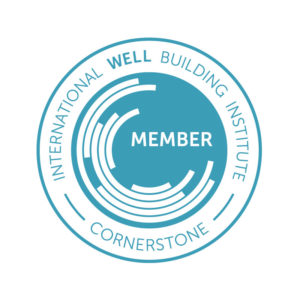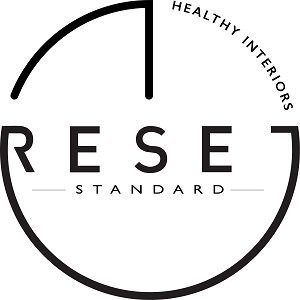
Green Building Certifications are Helping to Address COVID-19 Concerns
The green building certification industry has taken the initiative to help address concerns for returning to work and building design as it relates to COVID-19. The three most prominent certifications in the U.S. to date are the WELL Health-Safety Rating, the Arc Re-Entry score, and the RESET® Building Standard. All provide guidance to client looking to make a commitment to higher performing buildings for their employees, staff, and occupants. Some of the systems are more comprehensive than others, but all provide value through established protocols and benchmarks for improved performance going forward.
 The International WELL Building Institute™, or IWBI™, creators of the WELL Building Standard™, immediately took action by creating a Task Force on COVID-19. This task force is chaired by industry experts in public health, medicine, design, real estate, government, and academia. The Task Force has helped create a FREE comprehensive document providing Guidelines for Prevention and Preparedness, Resilience and Recovery which can help facility managers and owners plan for returning to work as well as continued improvements to help potentially mitigate the spread of COVID-19.
The International WELL Building Institute™, or IWBI™, creators of the WELL Building Standard™, immediately took action by creating a Task Force on COVID-19. This task force is chaired by industry experts in public health, medicine, design, real estate, government, and academia. The Task Force has helped create a FREE comprehensive document providing Guidelines for Prevention and Preparedness, Resilience and Recovery which can help facility managers and owners plan for returning to work as well as continued improvements to help potentially mitigate the spread of COVID-19.
The IWBI have also recently released a new Health-Safety Rating which is the most comprehensive of the certification options mentioned. The Health-Safety Rating can be used by projects or individual spaces that wish to provide a “seal” to demonstrate to employees, staff, and building occupants that the owner’s policies and building’s facilities maintenance and operations have made an evidence-based and third-party verified commitment to address strategies related to COVID-19 and encourage stakeholder engagement.

The WELL Health-Safety Rating includes 21 features across the following core areas, a minimum of 15 which need to be met:
- Cleaning and sanitization procedures
- Emergency preparedness programs
- Health service resources
- Air and water quality management
- Stakeholder engagement and communication
Pricing for the Health-Safety Rating ranges from free for projects currently registered for WELL Certification or WELL Portfolio but have yet to go through documentation review, up to $4,200 for standard locations. Additional pricing options are available for multiple locations and high-volume projects. Discounts are available for IWBI members and specific market/sectors such as schools, non-profits, low-income/affordable housing, and government/municipal buildings. The Health-Safety Rating certification is valid for one year. (More information on SSR’s IWBI membership can be found here.)
 The RESET Building Standard provides another third-party verified, sensor-based and performance-driven certification. This standard is strictly related to indoor air quality monitoring and performance. As stated by RESET, “research has shown the direct impact of humidity, temperature and airborne particulate matter on the rate of virus infections. RESET’s publicly available standards for hardware, software, installation and project performance, help provide a framework for tracking these parameters in a comparable manner so that the data can serve research, building operations and communication efforts.”
The RESET Building Standard provides another third-party verified, sensor-based and performance-driven certification. This standard is strictly related to indoor air quality monitoring and performance. As stated by RESET, “research has shown the direct impact of humidity, temperature and airborne particulate matter on the rate of virus infections. RESET’s publicly available standards for hardware, software, installation and project performance, help provide a framework for tracking these parameters in a comparable manner so that the data can serve research, building operations and communication efforts.”
RESET has minimum requirements for the type, quantity, location, and data output of indoor air quality monitors used on a project. These monitors must readily display for all building occupants air quality measurements below certain thresholds continuously over time. The critical parameters monitored include: PM2.5, TVOC, CO2, CO, temperature, and humidity.
Pricing for RESET Certification, ranges from approximately $1,705 for a 10,000 SF building to $4,653 for a 100,000 SF building. The certification requires renewal annually with additional site audits required every three years.
The U.S. Green Building Council (LEED™ and Arc™) and Green Building Certification Inc. (certify body for LEED, Arc, and WELL), have also taken steps to provide valuable guidance to both new construction and existing building projects going forward in a post COVID-19 world.
LEED has created several “Safety First” pilot credits which can be used as a general guideline of best practices for new and existing projects. If the project is pursing LEED certification these credits can contribute in the Innovation category towards a project’s overall certification goals. They have also created a dedicated webpage of additional resources specifically aimed at the design and construction industry. There is no cost for viewing or pursuing these credits. SSR will be publishing a future piece looking in detail at these LEED Pilot Credits.
 Arc, the USGBC’s platform for LEED for Existing Building certification, has created a program to be used as a stepping stone to WELL Health-Safety Rating and/or LEED v4.1 O+M certifications called Arc Re-Entry. This program requires no third-party document review or verification. Arc Re-Entry provides a web-based portal to compile documentation on infection-control policies and procedures, send and review occupant experience surveys, and track indoor air quality testing data (testing performed by others). The program can then generate a Re-Entry Comprehensiveness Score. The score provides a comparable measure of the depth of documentation of facility management policies, occupant experience and measured indoor air quality.
Arc, the USGBC’s platform for LEED for Existing Building certification, has created a program to be used as a stepping stone to WELL Health-Safety Rating and/or LEED v4.1 O+M certifications called Arc Re-Entry. This program requires no third-party document review or verification. Arc Re-Entry provides a web-based portal to compile documentation on infection-control policies and procedures, send and review occupant experience surveys, and track indoor air quality testing data (testing performed by others). The program can then generate a Re-Entry Comprehensiveness Score. The score provides a comparable measure of the depth of documentation of facility management policies, occupant experience and measured indoor air quality.
The program is free for these basic features and generating the Re-Entry Comprehensiveness Score. There is an upgrade, Arc Essentials, for $85/month for users that want to take it further with customized performance reports and guidance on how to make improvements specifically for a user’s project.
Looking for additional guidance from SSR on COVID-19? Check out our COVID-19 News page for additional expertise.







